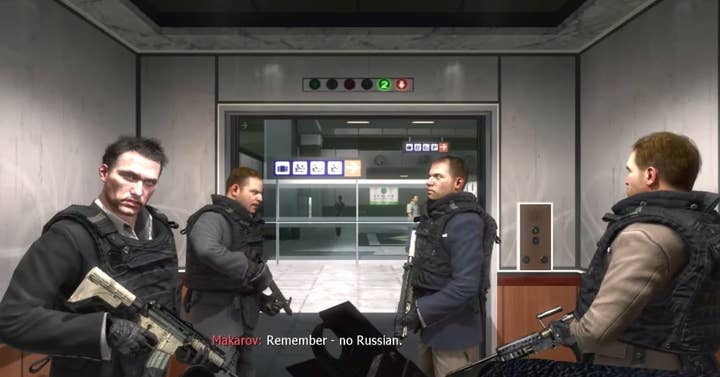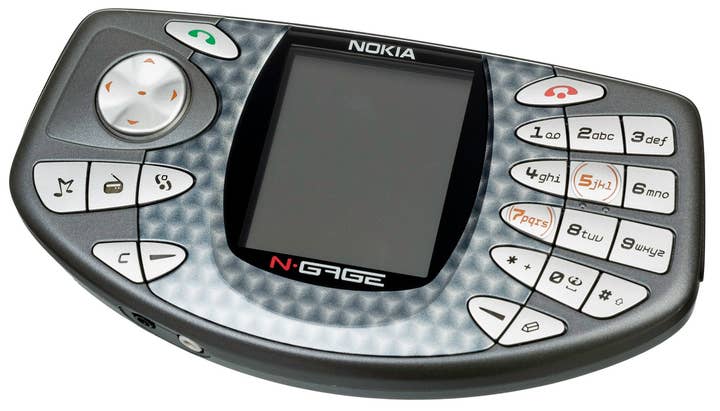Modern Warfare. Modern Warfare never changes.
10 Years Ago This Month: No Russian turns the mass shooting into mass market entertainment and Nokia buries the N-Gage for good
The games industry moves pretty fast, and there's a tendency for all involved to look constantly to what's next without so much worrying about what came before. That said, even an industry so entrenched in the now can learn from its past. So to refresh our collective memory and perhaps offer some perspective on our field's history, GamesIndustry.biz runs this monthly feature highlighting happenings in gaming from exactly a decade ago.
No Russian
Call of Duty: Modern Warfare 2 dominated the headlines a decade ago. The original Modern Warfare had catapulted the series from just another big AAA brand into a whole new echelon of success, and people were already raving about it. Not like 'rave reviews' raving, but more like the furious kind.
PC players were upset that the game wouldn't support dedicated servers. Retailers were mad that a number of their competitors had broken the street date on the game and GameStop responded by breaking the date as well (in the same markets, at least).
But above and beyond all that, people were mad about "No Russian," a level in the Modern Warfare 2 campaign in which players take on the role of an undercover operative joining a group of Russian terrorists in a mass shooting at a Russian airport which Americans will be framed for. Here's the ESRB's creepily dispassionate description of it from the explanation of its M for Mature rating:

Several civilians are gunned down at an airport as players are given a choice to participate in the killings (e.g., players can shoot a wounded civilian that is crawling on the ground), or walk by and observe without opening fire. In either case, civilians scream and emit pools of blood as they are shot to death.
"The scene is designed to evoke the atrocities of terrorism"
Activision on 'No Russian'
Footage of the level had leaked out weeks early, caused an entirely predictable uproar, and Activision responded by saying the footage was "not representative of the overall gameplay experience in Modern Warfare 2." Which is sort of like Pizza Hut saying, "Seven of the eight slices on your pizza were entirely free of dog feces, so it's really blowing things out of proportion for you to get hung up on the one part heaping with dog feces that did not represent your overall pizza experience."
The spokesperson continued, "Infinity Ward's Modern Warfare 2 features a deep and gripping storyline in which players face off against a terrorist threat dedicated to bringing the world to the brink of collapse. The game includes a plot involving a mission carried out by a Russian villain who wants to trigger a global war. In order to defeat him, the player infiltrates his inner circle. The scene is designed to evoke the atrocities of terrorism."
Clearly, Modern Warfare 2 is Very Serious Art tackling Very Serious Issues with its Very Serious Story. But at the same time Activision was trying to peddle that line, it was also explaining why it was pulling a promotional video joking about players who throw grenades haphazardly, featuring a group with a homophobic acronym (Fight Against Grenade Spam) and Philadelphia Phillies pitcher Cole Hamels calling those players "pussies."
"I think it was more of a social commentary joke of that stereotype than it was a fist-bump of acceptance to it"
Infinity Ward's Robert Bowling on the use of a homophobic slur in a Modern Warfare 2 ad
Infinity Ward creative strategist Robert Bowling defended the homophobia as "more of a social commentary joke of that stereotype than it was a fist-bump of acceptance to it." (Given that was the level of commentary Infinity Ward showed itself capable of, is it any wonder people didn't trust the studio to evoke the atrocities of terrorism in a tasteful and respectful manner?)
Another part of Activision's response to the blowback was to note that the level begins with a warning to the player that it contains disturbing elements and offers them the choice of skipping it. That was the case everywhere except in Russia, where the publisher blocked the level entirely because wallowing in the virtual slaughter of innocent people in a AAA amusement park is only acceptable if the player thinks of them as foreigners.
The game of course went on to be hugely successful, bringing in $550 million in its first five days and prompting Activision CEO Bobby Kotick to proclaim, "The title's success redefines entertainment as millions of consumers have chosen to play Modern Warfare 2 at unprecedented levels rather than engage in other forms of media." He also took advantage of the stock bump to cash out about $37 million in shares of the company.
This may sound familiar if you've been keeping up with current gaming news and the industry's penchant for absurd franchise naming practices, as Call of Duty: Modern Warfare is following closely in Call of Duty: Modern Warfare 2's footsteps. One of the first things we knew about it (via a Kotaku report) was that it would be "heavy on troubling, realistic emotional moments" inspired by the No Russian level.
The just-released game features a campaign about the Russian occupation of a fictional country in the Middle East. It lets players shoot a baby. Even though it results in a fail state, the game actually encourages and rewards players for doing so because it changes up the feedback when players continuously shoot the infant and turns the whole thing into an Easter Egg.
Modern Warfare also invokes "The Highway of Death," an actual Gulf War attack on retreating forces by Americans, but in the game's world the Highway of Death was the result of Russian forces bombing people looking to flee the combat area. That has drawn plenty of criticism on its own, and likely contributed to Sony's decision not to sell Modern Warfare on the PS Store in Russia.
I'm generally a believer in the idea that games can deal with any topic, in the same way the printed word or film can. But there are a whole host of topics that I think require a certain amount of care if you're going to feature them in your creation, no matter the medium. You can be provocative, but it needs to be done with due care and consideration, and for a greater purpose than boosting sales. Because if you're deeply disturbing people and pushing their buttons for attention and then you've got nothing productive to say or do with that attention once you've got it, then you're not some bold and daring creator asking questions and showing a complex situation from all sides; you're just hurting people for money.
Breaking Off the N-Gage-ment

It's been a decade since Nokia pulled the plug on its N-Gage platform, some six years after it debuted as a gaming handset with a revolutionary "side-talking" feature and an equally revolutionary "cartridge slot hidden under the phone battery" feature, and three years after it dropped the gaming-specific hardware and just made N-Gage a content delivery service compatible with a range of less-cool, front-talking phones. Obviously the N-Gage was functionally dead and gone long before this point, but this will reasonably be the last chance I have to reminisce about it in 10 Years Ago This Month, and I couldn't pass that up.
Good Call, Bad Call
GOOD CALL: How bad was Sony doing in 2009? It was "We'll be profitable in four years" bad. That probably didn't make investors feel too much better, but you have to give Sony credit for calling their shot, as 2013 did indeed see the company post its first full-year net profit in five years.
BAD CALL: RedOctane founder Kai Huang talked about the original Guitar Hero publisher and then Activision subsidiary's big plans, saying, "We're really just at the beginning of music games." Unfortunately they were just at the end of RedOctane, as the outfit would be shuttered in a round of Activision layoffs three months later.
GOOD CALL: With the launch of Assassin's Creed II just a week away, Ubisoft CEO Yves Guillemot said the company was looking to expand its market share quickly, going from about 6% at the time to 10%. According to its latest annual report, Ubisoft has about 9.6% of the market in the Americas, and 9.9% in Europe, the Middle East, and Africa, and that was actually down from 10.6% and 10.2% the year prior. It's safe to say its market share is less in Asia (the company didn't report figures for the region), but we'll treat these calls like hand grenades and say that close counts.
SORT OF IFFY CALL: Nintendo president Satoru Iwata dismissed suggestions that the industry was on the verge of a complete shift to digital distribution, saying, "It will require many years and months for the majority of videogame purchases to become digital. In short, in 20 years or so I might say it will have probably changed. But in five years or so I do not totally agree with opinions that no one will purchase titles at retailers by then. Habits of life do not change such radically and quickly. Especially for the expanded audience of various people to whom we are and will be trying to appeal, I believe their habits will change more slowly."
Nintendo this week reported 36.2% of its software sales for the first half of its fiscal year came digitally, so there has clearly been a move toward digital, and it seems likely that number will cross 50% well within the 10 years left on Iwata's timeline. That said, Iwata seems to be on target in saying that Nintendo's demographic will be slower to go digital than its competitors. Earlier this week, Sony announced its quarterly figures, with physical accounting for just 11% of its game software revenues (the 89% digital share includes full game sales and add-on content).
BAD CALL: In hyping the Kinect a year ahead of its launch (back when it was still called Project Natal), Xbox Live general manager Marc Whitten predicted the device would not only replace the remote control in the future, but would break down the boundaries between entertainment.
"I don't believe we are currently in the golden age of the television or the golden age of the game console or the golden age of the Internet; frankly, five years from now I don't know that you'll be able to tell the difference between those worlds," Whitten said.
It was four years later when Microsoft unveiled the Xbox One with a campaign that seemed to completely disregard the differences between those worlds. By the following year, Microsoft had learned its lesson about trying to break down those boundaries, bowing to customer demands for an Xbox One that didn't come with a Kinect.
BETTER CALL: Whitten's remarks are good fodder for jokes now, but for a while there it looked like Microsoft might really be on to something with Project Natal. In November of 2009, a full year before the launch, the company's expectations for its debut were a launch lineup of 14 new games and an ambitious 5 million units shipped. When Kinect finally did arrive in November 2010, it did so with a lineup of 15 titles and sold 8 million Kinects in the launch window.
Correction
In what can only be called an act of gross negligence, last month's 10 Years Ago This Month column made no mention of this. I regret the error, and offer my most profuse apologies.








